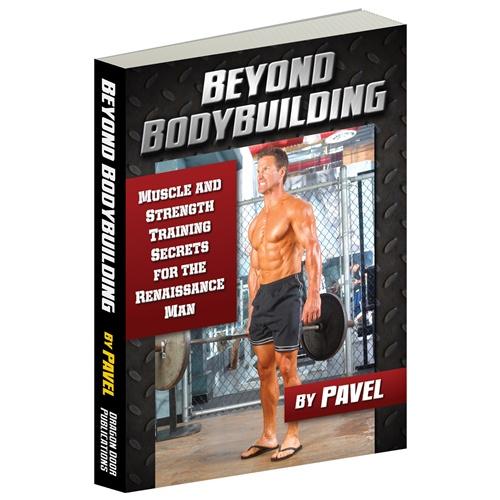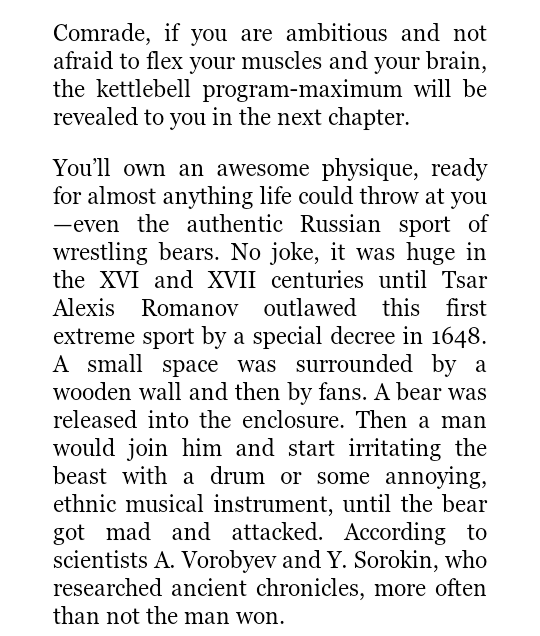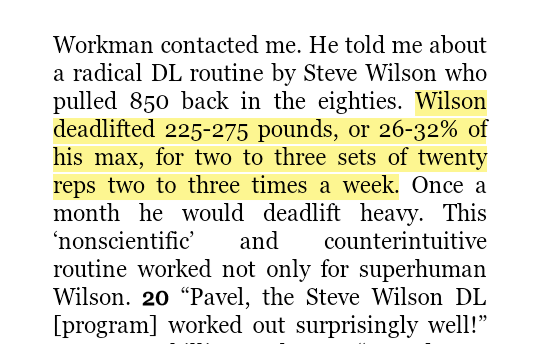“You don’t need a coach to learn power cleans, because we fixed things up so that you can learn them out of the book. And what exactly is the downside of trying to learn them and failing? Firing squad? The f*cking bodybuilders making fun of you from the safety of the dumbbell rack? Loss of wages? Just try them before you decide you can’t learn them without a coach.”
– Mark Rippetoe

Fitness secrets you won’t find on any blog
You’re looking for a way to switch up your workout. New lifts or routines. Maybe a “hack” that can help accelerate your progress. After doing some research you discover an exercise book that has exactly what you need. So you do what everyone does. Go to a different site that lists the book’s routine and copy it down.
Congratulations, you just saved yourself five bucks.
However, you’ve also passed up about a million dollars in information and context. Doing squats three days a week and eating huge amounts of protein sounds like a good strategy, but do you really know why you’re doing it?
Context is everything
Reading a routine and watching some YouTube videos is a poor substitute for real exercise books.
I’ve swung my kettlebell for two years without any real instruction. My “expertise” came from a few blog posts and two-minute videos.
While this didn’t hurt me, I did miss out on some great information.
A few weeks ago I bought The Russian Kettlebell Challenge: Xtreme Fitness for Hard Living Comrades on a whim. The book opened my mind to a whole bunch of cool new routines and exercises. It also gave some really interesting insights into how I could use a kettlebell to train for combat sports, or improve my arm wrestling abilities.

A 1,000 word blog post or five-minute YouTube video will never give you as much information as a 200 page book. The video maker or blogger might be able to cover some basics, but they’ll leave out a lot of extra information. That same kettlebell book had some surprisingly good information on deadlifts that I would have missed out on otherwise.

A big book will always have more to say than some flimsy article. Blog posts might give you some basic information, but they can’t contain everything.
One door leads to another
Blogs rarely contain any real fitness secrets because of their limited space. A post on squatting techniques can’t really branch out into other stuff. And while some authors might link to a different article, many lack the back catalog to do so. A lot of fitness bloggers haven’t been working out for a long time. I’m just as guilty of this as anyone else.
When you’re 21 or 25 and have been lifting for a couple of years there’s a lot you don’t know. A guy who trained for decades and became a coach is going to have way more experience under his belt. He’ll be able to share wisdom that you wouldn’t come across otherwise.
Going back to the kettlebell book I read, the author was able to incorporate information on deadlifts because he wasn’t limited in space. He didn’t have a 1,000 word limit that he couldn’t exceed. If he wanted to take a detour and talk about compound lifts for a chapter he could. No one was going to post an angry comment and it wouldn’t affect his search engine rankings.
Books might be longer and more boring than some video or blog post, but they also contain way more information. A good blog post might teach you one new thing. A good book will expose you to 20 new ideas.
Forums are never reliable
Sometimes I read this one forum where guys talk about exercise and fitness. One of the posters always argues with everyone else about over-training. He cites all kinds of arguments about how bad going to the gym is. “If you lift more than twice a week you’ll die” is pretty much what all his posts say.
This poster had been on the forum for years and held a lot of rep points for sharing “quality information.” I thought that he was going to be some big dude with a lot of exercise knowledge.
Eventually this fitness guru posted a picture of himself. He was in no way qualified to give any advice. The only time this guy could have ever seen a gym is when he was sitting at a buffet across the street from one. Had I been younger and dumber I might have gotten suckered into listening to him. And it would have really hampered my progress.
On another popular men’s site someone wrote an article titled: Bodybuilding Vs. Building Your Body.
In it the author talks about how two 45 minute gym sessions every week have turned him into some jacked superman. While all the other lifters are incompetent losers this guy is at his physical peak:
“If you’re doing bodybuilding the wrong way, you’ll end up just as my personal laughing stock in the gym did: huge Arms, bulging chest, no upper back, well advanced beer gut and toothpick legs. And I forgot to mention: An inferiority complex to match his arms.”
At the end of the post the author decided to share a picture of himself:

Not exactly a paragon of fitness. Listening to this guy would leave you looking like him. And I think most gym-goers would be disappointed.
Bonus: How to pick quality fitness books
There’s a lot of garbage floating around out there. Scam products, overpriced DVD’s, and “expert advice” from heavy steroid users. It can be hard to find the good stuff. Fortunately I’ve come up with a few pointers that can help you to locate exercise books that really work:
- Buy an actual book
With the rise of self-publishing there are a lot of junk eBooks. Some guy can hire a freelance writer to do a Google search about a topic and then use the information in his guidebook. Go on Amazon and look at all the cheap $0.99 and $2.99 fitness books. Most of them are churned out by big writing houses looking for a quick buck.
Don’t purchase anything under 100 pages. And make sure to avoid products that aren’t accompanied buy a blog or website. A guy who runs a high quality fitness site, and posts pictures of himself, will be more knowledgeable than some fly by night book written by a disinterested freelancer.
Spending $15 on a useful book like Super Squats is going to give you a huge return. You’ll bulk up and be able to understand the science behind your actions. Buying a 20 page title like Muscle Hacks Exposed! for $0.99 won’t give you any new information.
- Look for actual reviews from trusted sources
Mike from Danger & Play is one of the few guys who I always listen too. Go check out How to Gain 10 Pounds of Muscle Without Bulking, or any of the other fitness podcasts, and you’ll learn a ton of exercise secrets.
If Mike said “buy this book” I would. And that’s because he’s a source I trust. By the same token, if some shady Internet marketer endorsed something I’d roll my eyes.
When you’re unsure about a product email a blogger or person that you trust. Ask them. They’ll give you an honest answer.
Obviously you shouldn’t be spamming people with questions, but making one or two inquires won’t hurt.
- Find an author who you want to emulate
I’ve been enjoying Pavel Tsatsouline’s books. The man weighs the same as me but has a better physique. And he’s been training special forces teams, like the US Navy SEALs and Soviet Spetnaz, since the 1980’s.
I’ve gotten a lot of value from his blog and decided to pick up a few books to support him. I purchased The Russian Kettlebell Challenge, Hard Style Abs, and Power to the People Professional: How to Add 100s of Pounds to Your Squat, Bench,and Deadlift with Advanced Russian Techniques.
The total cost: nine dollars.
And I got 610 pages of content out of the deal. Even if I only get a handful of new techniques from each book it was still worth the money. Nine bucks is less than a giant latte from Starbucks.
You really can’t go wrong with an investment like that.